


Song Information
Updated November 28, 2024
The official Gene Autry biographer, Holly George-Warren, summarizes the history of the song Rudolph, the Red-Nosed Reindeer in her book Public Cowboy No. 1: The Life and Times of Gene Autry.
Public Cowboy No. 1: The Life and Times of Gene Autry
written by Holly George-Warren
(page 250 – 251)
But it was Gene's second session – on June 27, 1949 – that yielded the most enduring hit of his entire career.

"Here Comes Santa Claus" had begged a follow-up: submissions arrived over the transom from numerous eager songwriters, including one tuneful narrative based on a 1939 poem popularized by Montgomery Ward. The story of an outcast reindeer whose "difference" ultimately helped him save Santa's threatened sleigh ride, "Rudolph, the Red-Nosed Reindeer" was written by veteran composer Johnny Marks. His brother-in-law, copywriter Robert L. May, originally had penned the verse for the department store's annual holiday booklet giveaway, a practice discontinued in 1947. The copyright became May's, who got the poem published as an illustrated children's book that sold one hundred thousand copies. May then permitted Marks to use the story for a composition. "I thought about it for a while and sat down to write a song about it," Marks related. "That song was easily one of the worst songs ever written. Then about a year later I was walking down the street when a new melody came to me. It's the only time that ever happened, and I have to admit, it's a great melody." Marks sent a demonstration recording to RCA Victor recording artist Perry Como, but the pop singer turned it down when the composer wouldn't allow him to change any lyrics. Marks later confessed to Gene it had been rejected by Bing Crosby and Dinah Shore as well.

Over the years, Gene always told the story that he didn't care for the song either, but that Ina heard Marks's demo acetate and, "enchanted" by its "Ugly Duckling" theme, encouraged him to record it. It became widely acknowledged that if not for Ina, there would be no "Rudolph" by Gene Autry. According to Carl Cotner's widow, Juanita, Marks originally contacted Gene's musical director and "wanted Carl to talk Gene into [recording it]... Johnny Marks had... said, 'I'll give you a piece of the action if you will do it,' and Carl said, 'Well, I don't want that,'... which was not a good business [decision], but that was Carl. Carl had told Gene, 'I think it's a good song for you,' and Carl did the arrangement. When working out the material for the session, Gene said, 'How about that song that you're so crazy about?' They threw it up on the stand, and did it in one take... [Later] a publicity man put it out that it was Ina that talked Gene into it."

"Rudolph" eventually would be recorded by more than five hundred artists, but Marks always preferred Gene's version: "The great success of the Rudolph record," Marks wrote him the following year, "was your perfect rendition of the song... Two bar intro, ad lib verse, solo chorus in tempo, thirty-two bar instrumental, and the last chorus with the Pinafores." In 1961 he told Gene, "What I sent you in 1949 were ink dots on a piece of paper. You had to translate this into a sound, lyrically and musically, that people would like. How many great songs have been lost because of the wrong rendition? Many people have said: 'Any one could have made a hit with Rudolph.' My answer has always been: 'We'll never know. I only know that Gene Autry did do it, and that all the others followed."

Five weeks later, on August 4, Gene cut two more Christmas numbers, "Santa, Santa, Santa" (credited to Haldeman and Autry) and "If It Doesn't Snow on Christmas," the latter of which became the flipside to "Rudolph." As Columbia previously had packaged "Here Come Santa Claus," "Rudolph" was issued in a colorful picture sleeve. "[This] marketing innovation... emerged in the late forties with Gene Autry's 'Here Comes Santa Claus' and 'Rudolph,'" according to music historian Dave Marsh. "This was little more than a sales technique based on the theory that if a youngster or his mother were shopping for records, and the kid spotted a colorful cartoon picture of Santa on the sleeve of 'Here Comes Santa Claus,' junior would pester mom until she put some cash into the pocket of the shrewd record marketer. Picture sleeves soon became a prestige part of any single release."

"Rudolph" became a favorite on The Hit Parade and soared to the top of the Billboard country & western and pop charts – a first for Gene. (In 1947 "Here Comes Santa Claus" had been Gene's initial entry on the prestigious Billboard pop chart.) Marks later recalled how Gene helped to promote the song: "I recall my struggle of 1949 and how you went out of your way to help. Among the many, many things you did, I particularly remember asking you to sing the song at Madison Square Garden. You were reluctant and rightly so, but said you would try it out and you did... I asked you to do it on your radio show. You told me the producer and sponsor were adamant against doing a Christmas song so early, but did it anyway." For the rodeo Marks even supplied Gene with a Rudolph costume with flashing red nose, donned by Frankie Marvin, who pranced around the arena. (After the Boston Garden stint, he somehow lost the pants, which Marks replaced for the 1950 rodeos.) During it first year of release, "Rudolph" sold two million copies, selling an estimated twenty-five million more over the next forty years. For decades it remained the best-selling single of all time after Bing Crosby's "White Christmas."

"Rudolph" also anticipated a new trend for Gene: recording discs specifically geared to the children's market.
In 2024 when Gene Autry's recording of the song Rudolph, the Red-Nosed Reindeer was inducted into the National Recording Registry, the Library of Congress asked Gene Autry biographer Holly George-Warren to write an essay for this special honor.
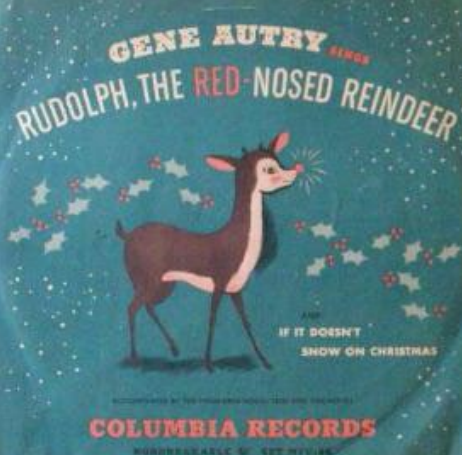
“Rudolph, the Red-Nosed Reindeer”--Gene Autry (1949)
Added to the National Registry: 2024 Essay by Holly George-Warren (guest post)
One of the best-selling Christmas records of all time, “Rudolph, the Red-Nosed Reindeer” was also the biggest and most enduring hit for the artist who introduced it to the world: singing cowboy star Gene Autry. Twenty years into his groundbreaking career as a recording artist and Western film pioneer, Autry brought his distinctive warm vocals to composer Johnny Marks’ “ugly duckling” story-song, making it a perennial holiday standard. The lives of the Jewish New Yorker (born November 10, 1909) and Texas-born musician (born September 29, 1907) couldn’t have been more different, yet the combination of songwriter and singer was perfect.
Gene Autry, whose father deserted the family, dropped out of high school to support his mother and three siblings as a relief telegrapher for the Frisco Railroad. Marks, the nephew of the Borough President of Manhattan, attended prestigious universities. Both men served in World War II. “Rudolph” was the first of many successful holiday-themed Marks compositions; Autry scored his first hit in 1932 with “That Silver Haired Daddy of Mine.”
The ambitious Autry didn’t leave his job on the railroad until several years after he first auditioned on guitar and vocals for New York record labels in the late 1920s. As the “Oklahoma Yodeling Cowboy,” he began making a name for himself on Tulsa radio station KVOO. He recorded his first hit--written by his father-in-law and fellow railroad man Jimmy Long--for the American Record Corporation (the predecessor to Columbia Records) in October 1931. He parlayed that success onto Chicago’s WLS National Barn Dance and his own “Conqueror Record Time” radio show. His fancy Western duds and Martin guitar with his name emblazoned on its neck became his trademark, and soon Hollywood beckoned. He first gained attention in a small part as a singing cowboy in a Ken Maynard B-Western, “In Old Santa Fe,” and audiences clamored for more Gene Autry. He was then cast as the lead in a 12-chapter sci-fi-meets-Western serial, “The Phantom Empire.” He played a cowboy singer, who after battling villains, races his horse back to the Radio Ranch in time to make his weekly broadcast. He would go on to play himself, a singing cowboy named Gene Autry, in 93 musical Westerns beginning with “Tumbling Tumbleweeds” in 1935. The title song was an Autry hit, as were many of the popular Columbia recordings like “Back in the Saddle Again” featured in his movies (often with the same title as the song). Autry’s massive success at Republic Pictures created the prototype for the musical B-Western genre, with others like Roy Rogers soon to follow.
In 1947, Autry scored his first Christmas smash with his cowrite, “Here Comes Santa Claus (Right Down Santa Claus Lane)” with Oakley Haldeman. Two years later, Autry longed for another holiday hit, and Johnny Marks was looking for an artist to record his breakthrough song. “Rudolph” came to Marks via a family connection. His brother-in-law, Robert L. May, was an advertising copywriter for Chicago department store Montgomery Ward, and as a Christmas promotion he created the character of Rudolph the Red-Nosed Reindeer. In 1939, Rudolph first appeared in an illustrated booklet given out to holiday shoppers. The company stopped the promotion in 1947, with May retaining the Rudolph copyright. He then published the tale as a poem in a children’s book, which sold 100,000 copies, before passing Rudolph along to Marks. “I thought about it for a while and sat down to write a song about it,” Marks later said. “That song was easily one of the worst songs ever written. Then about a year later I was walking down the street when a new melody came to me. It’s the only time that ever happened, and I have to admit, it’s a great melody.”
He first pitched “Rudolph” to Perry Como, who turned it down. Marks then reached out to Autry’s music director Carl Cotner, who passed the demonstration recording to Autry. He later said his wife Ina convinced him to cut the song. On June 27, 1949, in a Hollywood studio, the recording featured Autry on lead vocals, accompanied by singing sister group the Pinafores: Ione, Beulah, and Eunice Kettle. Referred to Autry by his friend Les Paul, the harmonizing trio had been performing on his “Gene Autry Show” on the CBS national radio network since 1946. Also on the session were other members of Autry’s musical troupe, including Cotner on violin, hotshot guitarist Johnny Bond (a solo artist in his own right), and upright bassist Bert Dodson, a member of the Cass County Boys, who toured and recorded with Autry.
Columbia released “Rudolph” as the A-side of a single (backed with Autry/Haldeman’s “He’s a Chubby Little Fellow”) in September. To help promote it, Autry began performing “Rudolph” on his radio show, and after Marks sent him a Rudolph costume with a flashing red nose, he included the number in his month-long stint at Madison Square Garden that fall (with troupe member Frankie Marvin dressed as Rudolph). By Christmas, the record had soared to the top of the “Billboard” pop and country & western charts, a first for Autry. Selling nearly two million copies by year’s end, it became one of Columbia Records’ best-selling singles. Every Yuletide season since, the record garners heavy rotation, eventually attaining the RIAA Platinum level in sales. In 2019, seven decades after its release, Autry’s original version of “Rudolph” reached #16 on the “Billboard” Hot 100.
Marks would write other beloved holiday standards, including Brenda Lee’s “Rockin’ Around the Christmas Tree” and “Holly Jolly Christmas” performed by Burl Ives. At last count, “Rudolph” has been recorded by some five hundred artists. But Marks always preferred the Autry original: “The great success of the Rudolph record,” Marks wrote Autry in a 1950 letter,
“was your perfect rendition of the song… Two bar intro, ad lib verse, solo chorus in tempo, thirty-two bar instrumental, and the last chorus with the Pinafores….” In 1961, he again wrote Autry: “What I sent you in 1949 were ink dots on a piece of paper. You had to translate this into a sound, lyrically and musically, that people would like. How many great songs have been lost because of the wrong rendition? Many people have said: ‘Anyone could have made a hit with Rudolph.’ My answer has always been: ‘We’ll never know. I only know that Gene Autry did do it, and that all the others followed.”
Two-time Grammy nominee Holly George-Warren is the award-winning author of 18 books, including “Public Cowboy No. 1: The Life and Times of Gene Autry” (Oxford University Press, 2007). Her other biographies include “Janis: Her Life and Music” and “A Man Called Destruction: The Life and Music of Alex Chilton.” She has co-written books with Dolly Parton and Woodstock festival producer Michael Lang, and contributed to such publications as “Rolling Stone,” the “New York Times,” “Oprah Daily,” and “Texas Monthly,” among others.
*The views expressed in this essay are those of the author and may not be the views of the Library of Congress.
Original posting of Holly George-Warren's Essay found on the Library of Congress website here: https://www.loc.gov/static/programs/national-recording-preservation-board/documents/Rudolph-the%20Red-Nosed-Reindeer_Warren.pdf
Publishing Information
Rudolph, the Red-Nosed Reindeer
(Johnny Marks)
© 1949, Renewed,
St. Nicholas Music Inc.
ASCAP
Licensing inquires contact:
![]()
St. Nicholas Music Inc.
254 West 54th St., Twelfth Floor
New York, NY 10019-5516
Telephone: (212) 582-0970
Fax: (212) 582-1097
Website: www.stnicholas.com
Email: info@StNicholas.com
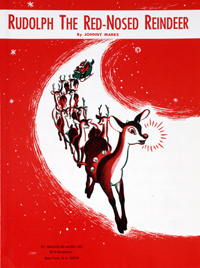
Gene Autry's Columbia Records Information for
Rudolph, the Red-Nosed Reindeer
Columbia Records
Recorded June 27, 1949 in Hollywood, CA
Rudolph, the Red-Nosed Reindeer (Johnny Marks)/
He's a Chubby Little Fellow
Gene Autry, Vocals; accompaniment Johnny Bond, guitar, Bert Dodson, base; Carl Cotner, violin; Louise Heising, violin, The Pinafores, vocals, unknown clarinet, trumpet
This recording of Rudolph, the Red-Nosed Reindeer is a Platinum Record.
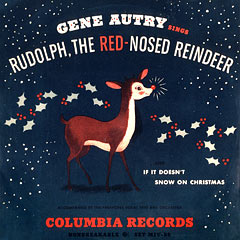
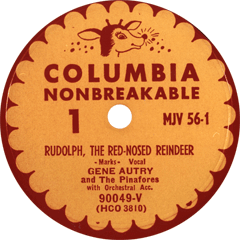
In the Autumn of 1957 in Hollywood, California Gene Autry recorded seven Christmas tracks that were originally released on LP as Christmastime with Gene Autry on his own Challenge record label.
He of course included Rudolph, the Red-Nosed Reindeer for this collection. All songs had vocals by Gene Autry with accompaniment by full orchestra and chorus condected by Carl Cotner.
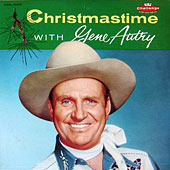

The National Recording Registry is a list of sound recordings that "are culturally, historically, or aesthetically significant, and/or inform or reflect life in the United States." The registry was established by the National Recording Preservation Act of 2000, which created the National Recording Preservation Board, whose members are appointed by the Librarian of Congress. The list of 25 recordings selected for 2024 include Gene Autry's record "Rudolph, the Red-Nosed Reindeer". Read More Here

Gene Autry's Christmas Classics Debut on Billboard Hot 100 in 2018
The 2018 holiday season was extra special for Gene Autry and his classic Christmas songs because Rudolph, the Red-Nosed Reindeer and Here Comes Santa Claus (Right Down Santa Claus Lane) charted on the Billboard Hot 100 for the first time!
ASCAP's Top Holiday Songs

Every November, the American Society of Composers, Authors and Publishers (ASCAP) announces its Top 25 most-performed holiday songs for the past five years. Of course, Gene Autry is on this list and so is the song Rudolph, the Red-Nosed Reindeer!
Performers Who Have Recorded
Rudolph, the Red-Nosed Reindeer

You know Dasher and Dancer and Prancer and Vixen
Comet and Cupid and Donner and Blitzen
But do you recall the most famous reindeer of all?
Rudolph, the red-nosed reindeer
Had a very shiny nose
And if you ever saw it
You would even say it glows.
All of the other reindeer
Used to laugh and call him names
They never let poor Rudolph
Join in any reindeer games.
Then one foggy Christmas Eve
Santa came to say
Rudolph with your nose so bright
Won't you guide my sleigh tonight?
Then how the reindeer loved him
As they shouted out with glee
Rudolph, the red-nosed reindeer
You'll go down in history.

Gene Autry Sheet Music
For Rudolph the Red-Nosed Reindeer
The Gene Autry Christmas Book
(2014) Songbook